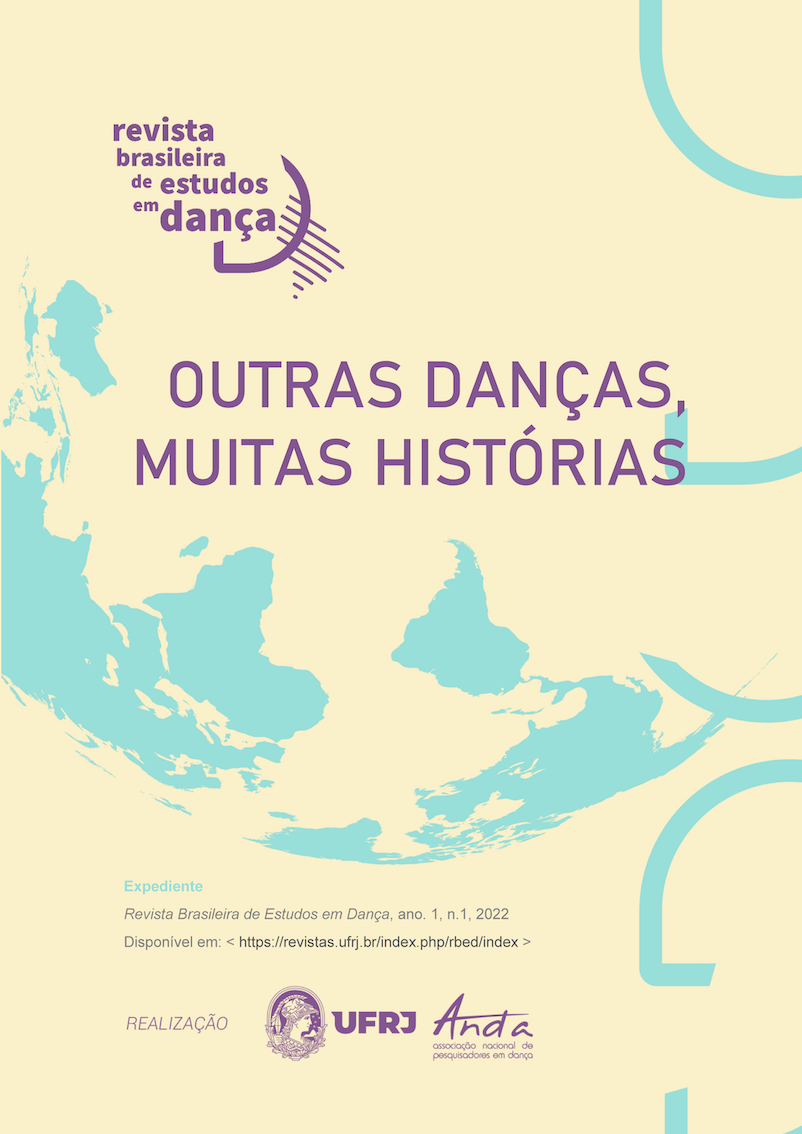Provincializar el re-enactment:
crítica de la idea de patrimonio en pos de una historicidad sensible de la obra de danza
DOI:
https://doi.org/10.58786/rbed.2022.v1.n1.53679Palavras-chave:
historia de la danza, teoría de la danza, teoría poscolonial, memoria, danza contemporánea.Resumo
El objetivo de este trabajo es ofrecer una aproximación al concepto de reenactment desde un enfoque ligado a la teoría poscolonial. En ese sentido, se propone provincializar el reenactment, es decir, renovar su significado desde y para el sur global. El concepto de reenactment es entendido como una crítica implícita de la objetualización de la obra de danza y de la monetización del pasado característica de la economía neoliberal. Su funcionamiento como eje del trabajo artístico tiene la capacidad de revelar el lugar de la historia en la escena que para el caso de la danza en Buenos Aires remite a una poética de la ausencia, ligada a la experiencia histórica de la última dictadura.
Downloads
Referências
AGNEW, Vanessa. History’s Affective Turn: Historical Reenactment and Its Work in the Present. Rethinking History, v. 11, n. 3, p. 299-312, 2007.
BOURDIEU, Pierre. Quelques propriétés des champs. In Questions de sociologie, Paris: Minuit, 2002, p. 113-120.
CHAKRABARTY, Dipesh. Al margen de Europa. Pensamiento poscolonial y diferencia histórica. Barcelona: Tusquets, 2008.
FRANKO, Mark (Ed.). The Oxford Handbook of Dance and Reenactment. Oxford: Oxford University Press, 2017.
FRANKO, Mark y VALLEJOS, Juan Ignacio. Teatralidad y Performance en Foster y Butler: sobre el lugar de la coreografía en la filosofía. Debate Feminista, v. 62, p. 47-71, 2021.
FRANKO, Mark. Writing for the body: notation, reconstruction, and reinvention in dance. In Choreographing Discourses. A Mark Franko Reader. London, New York: Routledge, 2019, p. 13-28.
GUARATO, Rafael. Ballet Stagium e a fabricação de um mito. Curitiba: CRV, 2019.
GUARATO, Rafael. Del abandono como práctica historiográfica para una historiografía del abandono. Investigaciones en Danza y Movimiento, n. 1, p. 3-21, 2019.
LAET, Timmy de. Giving Sense to the Past: Historical D(ist)ance and the Chiasmatic Interlacing of Affect and Knowledge. In FRANKO, Mark (Ed.). The Oxford Handbook of Dance and Reenactment. Oxford: Oxford University Press, 2017, p. 33-56.
LAUNAY, Isabelle. Cultures de l’oubli et citation. Les danses d’après, II. Paris: CND, 2019.
LAUNAY, Isabelle. Poétiques et politiques des répertoires - Les danses d'après, I. Paris: CND, 2017.
LAUNAY, Isabelle. Réinventer l'héritage chorégraphique ou la passe des ‘Carnets Bagouet’. Filigrane, n. 3, p. 153–171, 2006.
LEPECKI, André. The Body as Archive: Will to Re-Enact and the Afterlives of Dances. Dance Research Journal, v. 42, n. 2, p. 28-48, 2010.
LOUPPE, Laurence. Poétique de la danse contemporaine. Bruxelles: Contredanse, 1997.
MARTIN, Randy. A precarious dance, a derivative sociality. TDR/The Drama Review, v. 56, n 4, p. 62–77, 2012 .
NACHBAR, Martin. Tracing Sense/Reading Sensation: an essay on imprints and other matter. In FRANKO, Mark (Ed.). The Oxford Handbook of Dance and Reenactment. Oxford: Oxford University Press, 2017, p. 19-32.
POUILLAUDE, Frederic. Le désœuvrement choreographique. Paris: Vrin, 2009.
REYNOLDS, Simon. Retromanía: la adiccion del pop a su propio pasado. Buenos Aires: Caja Negra, 2012.
SCHNEIDER, Rebecca. Performing Remains: Art and War in Times of Theatrical Reenactment. London, New York: Routledge, 2011.
VALLEJOS, Juan Ignacio. El Cuerpo-archivo y la Ilusión de la Reconstrucción: el caso de la Consagración de la Primavera de Dominique Brun. In CAROZZI, Maria Julia (Ed.). Escribir las danzas: coreografías de las ciencias sociales. Buenos Aires: Gorla, 2015, p. 141-175.
VALLEJOS, Juan Ignacio. Subverting Precariousness. Work, History and Aesthetics in Buenos Aires Contemporary Dance. Dance Research Journal, v. 51, n. 1, p. 32-46, 2019.
Downloads
Publicado
Versões
- 2024-05-10 (6)
- 2023-12-01 (5)
- 2023-11-30 (4)
- 2023-11-30 (3)
- 2023-11-30 (2)
- 2022-07-30 (1)
Como Citar
Edição
Seção
Licença
As pessoas autoras que publicarem na Revista Brasileira de Estudos em Dança são os responsáveis pelo conteúdo dos artigos assinados e retém os direitos autorais. Concedem à revista o direito de primeira publicação com o trabalho simultaneamente licenciado sob a Licença Creative Commons Atribuição-Não Comercial 4.0 (Open Archives Iniciative - OAI). Esse recurso, utilizado para periódicos de acesso aberto, permite o compartilhamento do trabalho para fins não comerciais com reconhecimento da autoria. Caso o texto venha a ser publicado posteriormente em outro veículo, a pessoa autora deverá informar que o mesmo foi originalmente publicado como artigo na Revista Brasileira de Estudos em Dança. Assim sendo, ainda que a revista seja detentora da primeira publicação, é reservado às pessoas autoras o direito de publicar seus trabalhos em repositórios institucionais ou em suas páginas pessoais, mesmo que o processo editorial não tenha sido finalizado.
É reservado à revista o direito de realizar alterações de ordem normativa, ortográfica e gramatical visando manter o padrão de língua, respeitando-se, porém, o estilo autoral.

